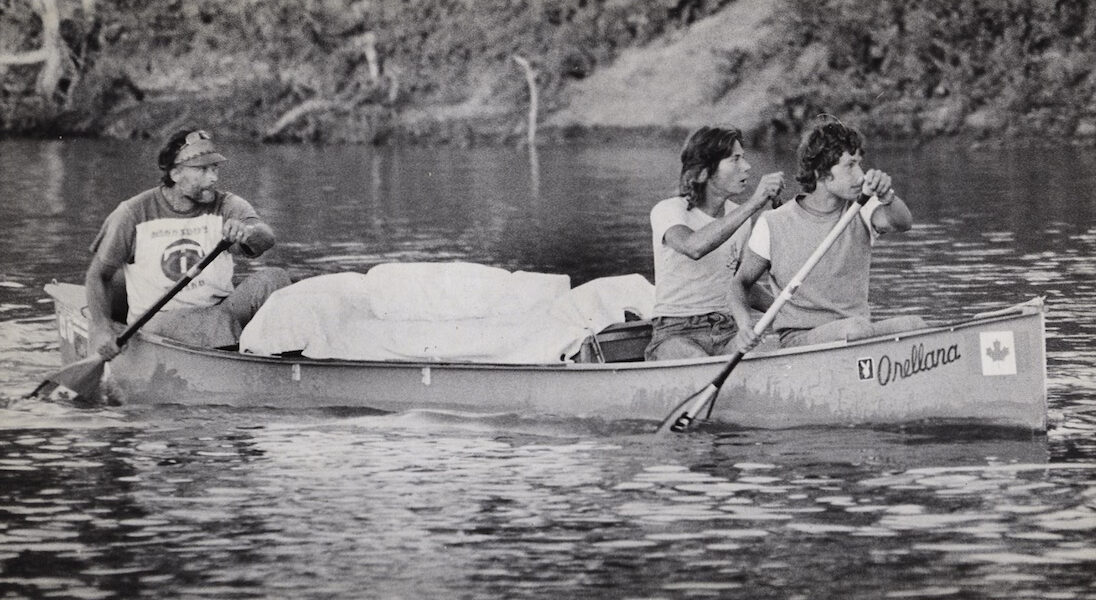Guns, alligators, thirst, starvation, mosquitoes and drowning. Other than that how was your vacation?
On the morning of June 1, 1980 Don Starkell and his two sons, Dana and Jeff, climbed aboard Orellana, their 21-foot canoe and launched on the 40-foot wide Red River from a park near their home in Winnipeg, Canada. As they paddled off, Don said, “All aboard for the Amazon Hotel.“
The Amazon Hotel was a seedy flophouse on the outskirts of town. Friends and family members laughed because they knew the real voyage was to terminate at a very different Amazon Hotel. The Starkell’s plan was to paddle 12,000 miles from Winnipeg to Belém, Brazil, at the mouth of the Amazon River.
Don was an experienced freshwater canoe skipper but he and his boys were facing something very different.
The Red River eventuality gave onto the Mississippi at the end of the first month. Rolling down the Mississippi was one long party as well-wishers fed them and put them up all along the 700 miles to New Orleans. But the river traffic became denser and the commercial vessels’ bow waves threatened to sink the craft several times a day. Still they were flowing with the current and many rafters, canoers and kayakers had completed this trip. (Jeff was 18 and his brother, Dana, 19 when they set off.) Once out in the Gulf of Mexico the seas became unmanageable and they headed for shore. As they were surfing a sizable breaker to the beach they tumbled end over end and scurried to retrieve their supplies. After struggling for days in high seas they retreated inland to the Laguna Madre a long inland sea protected from the surf. This restored their confidence but as they paddled, the sea became shallower and shallower. First it was two feet deep, then one and finally they found themselves in an uncharted desert of mud with the sea some unknown miles to the east. They had little food and water and it was a very hot autumn.
There were no trees, no hills, no road, no town, no people and GPS was years in the future. So Jeff and Don walked for a day toward the coast and finally came upon a small fishing village where the kind locals sent a rescue party. After recuperating they set off once more. It was now November; Jeff decided he had had enough and returned to Canada.
Don and Dana paddled past Vera Cruz and around the Yucatan Peninsula in the spring, 10 months after their departure. Off Belize they camped on a spit of sand with few trees when a hurricane swept the island leaving a few palms, them and their very well used canoe. Next, Honduras which has been a hard place for, well…ever.
A pair of vigilante soldiers captured the pair, took their stuff and were marching them into the jungle to shoot them when some locals threatened to tell some higher authorities and Don and Dana escaped. Today Honduras is even harsher and recreational canoeing is not possible. In all they were threatened 13 times at gunpoint. Costa Rica and Panama went well enough as they hit the one year anniversary of their departure.

Don and Dana
They did what so many voyagers of this sort do: they traveled on their local notoriety and news clippings. They never had proper immigration permits but the officials generally looked kindly on them though they did spend more than a few nights in custody. They made the trip without sponsorship and survived by their wits and the kindness of strangers.
Passing Colombia, (then very dangerous), they stopped at Trinidad (not in the least dangerous) which is opposite the mouth of the Oronoco River in Venezuela (then the richest country in South America, now the poorest).
On March 31, 1982, Don and Dana finally entered the Amazon River. They had expected verdant jungle, instead they found broken landscapes stripped of trees, overrun with cattle. And this was 40 years ago. It’s worse now.
The last 1,000 miles of the Amazon is a vast inland sea and it was flood season so they were frequently out of sight of land. The Amazon drains nearly three million square miles and has an average rate discharge of 75 million gallons…per second.

‘We did it!”
Back home two years later the men reported feeling a bit lost because going to the grocery store and walking down a street without the constant threat of death was unfamiliar to them.

They paddled 12,182 miles, setting a record that still stands.







Sounds like something you and your boys would do!
You’ve taken me away from a gray, cold day to imagine this fantastic journey. Thank you!
Dont know about that
Dang the universe was truly with them as with all of us
That captain was some voyage and again true as that is place i will never go
O
Wait, they didn’t paddle back?
An amazing story!
It’s not too late Dad, let’s go!
They started 5 days before I was born. Great story.